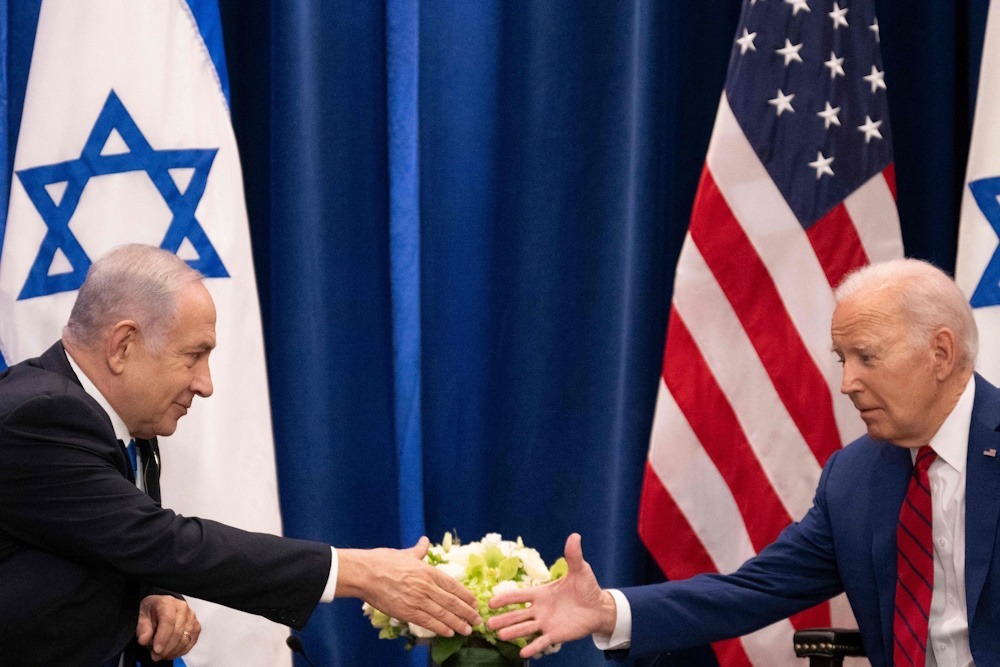Israel-US tension increases over Rafah attack

The Biden administration is facing a significant challenge as it tries to prevent Israel from launching an attack on Rafah in the Middle East.
Shortly after President Biden cautioned Israeli Prime Minister Benjamin Netanyahu against launching a large-scale attack on Rafah, Israel’s military carried out precise airstrikes in the eastern area of the city.
The Israeli attack highlighted the stark contrast in perspectives between Biden and Netanyahu regarding the approach to secure the release of hostages held by Hamas and ultimately bring an end to the conflict.
Up until now, the White House has been unsuccessful in securing a cease-fire between Hamas and Israel, as well as convincing Netanyahu to postpone the Rafah offensive.
On Monday, Hamas announced that it had agreed to a temporary cease-fire. The U.S. stated that it was evaluating the Hamas response, while Israel expressed dissatisfaction with the group’s introduction of new conditions.
Ever since his visit to Israel during the war, President Biden has become a staunch advocate for the country.
Large sums of money in American weaponry have been sent to Israel, and the U.S. has consistently supported Israel’s right to self-defense. This approach, known as a “bear hug” strategy, was intended to allow the U.S. to discreetly influence the decision-making of Israeli leaders.
Over the past few weeks, the Biden administration has been actively working to increase pressure on Israel and Hamas in order to achieve a six-week cease-fire. U.S. officials were optimistic that they could potentially extend this cease-fire through diplomatic means.
According to U.S. officials, a temporary halt is necessary to ensure the safe return of hostages, including American citizens, and create a chance for diplomatic initiatives to foster the improvement of relations between Saudi Arabia and Israel.
Secretary of State Antony Blinken expressed optimism about the potential outcomes of the negotiations, emphasizing the importance of achieving a deal, a cease-fire, and the safe release of hostages. He highlighted the intention to further develop and maintain a sustainable solution in the long run.
On the other hand, Netanyahu has stressed the importance of launching an offensive against the four Hamas battalions and their leaders in Rafah. He believes that this operation should be carried out after a cease-fire agreement is reached, which is still being negotiated.
“It is inconceivable that we would halt the war without accomplishing all of its objectives,” Netanyahu stated last week, as per a statement from his office. He stated that Israel would enter Rafah to eliminate the Hamas battalions there, regardless of whether a deal was reached or not.
Even if a cease-fire proves difficult to achieve, the U.S. has been consistent in its stance that it would not back a significant Israeli ground incursion on Rafah unless Israel can demonstrate a viable plan to protect the safety and access to humanitarian aid for the over one million Palestinians seeking refuge in the city. However, some U.S. officials express doubts about the feasibility of this goal.
“The United States will not provide support for the current plan of action in Rafah as proposed by Israel,” stated Matthew Miller, a spokesperson for the State Department on Monday. Such an offensive would have a significant impact on the well-being of the Palestinian people.
On Monday, the Israelis issued a notice to 100,000 individuals, urging them to relocate from eastern Rafah to the coastal area of al-Mawasi. They also emphasized their intention to employ significant measures against the terrorist organizations in the vicinity of your residence.
It is speculated that Israel’s recent action may be a strategic move to avoid a large-scale ground assault, as advised by the U.S. Instead, they seem to be focusing on conducting smaller operations to gain control over the Gaza-Egypt border.
It appears that their intention is to implement it gradually. According to Aaron David Miller, a former U.S. peace negotiator who is now at the Carnegie Endowment for International Peace, the Biden administration’s stance on this issue may not align with their previous criticisms. “Netanyahu’s primary concern lies in preserving his coalition rather than prioritizing Joe Biden’s satisfaction.”
Netanyahu’s popularity is slowly rebounding after a sharp decline caused by Israel’s devastating security failure on Oct. 7. During this incident, Hamas exploited lapses in security measures and tragically claimed the lives of 1,200 individuals in southern Israel. However, his ability to remain as prime minister hinges on maintaining his slim parliamentary majority and avoiding any conflicts with the far-right members of his government who are against ending the war until Hamas’s stronghold in Rafah is captured.
During Biden’s 30-minute call on Monday with Netanyahu, the president addressed the ongoing negotiations for a cease-fire and hostage deal. In a recent development, the White House has announced that Israel has agreed to reopen the Kerem Shalom border crossing. This crossing plays a crucial role in facilitating the delivery of aid to Gaza. It had been closed following a tragic incident where four Israeli soldiers lost their lives due to a Hamas rocket attack in the vicinity on Sunday.
One concern for the Biden administration is that a small-scale operation could potentially lead to a significant number of Palestinians seeking refuge, which could strain the available resources for providing shelter, food, and medical assistance to the displaced population in Rafah.
In light of the disagreement regarding the potential Rafah operation, the Biden administration has chosen to postpone the sale of numerous precision weapons to Israel. This marks the second occasion in recent months where the United States has temporarily halted an arms deal with its closest Middle East ally amidst the ongoing conflict in Gaza.
This decision will have an impact on approximately 6,500 Joint Direct Attack Munitions. These kits are crucial in allowing unguided bombs to be precisely directed towards their intended targets through the use of satellite guidance.
The White House did not confirm or deny the move, but the timing indicated that it was a strategic move to exert pressure on Israel and discourage them from hastily launching an assault on Rafah.

